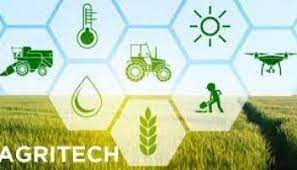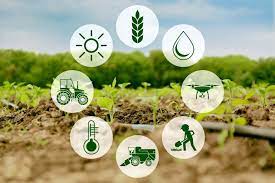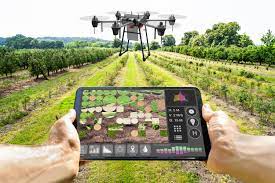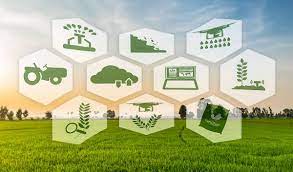Do you want to start an AgriTech Firm?
Do you want to Discover about the Opportunities inherent in AgriTech?
Are you interested in Conceptualizing an AgriTech Start-up Idea?
If the answer to any of these question is "Yes", you are on the right page
READ ON!!!
There has been a surge in the number of agri-food tech startups that are developing innovative solutions for the agribusiness industry, such as agtech, foodtech, and biotech companies.
- Foodtech startups are playing an increasingly important role in the agribusiness industry. These startups are developing new technologies, products, and services to address some of the major challenges facing the industry, such as climate change, food security, and sustainable agribusiness.
- Agtech startups are developing technologies to optimize farming practices, such as precision agriculture, robotic automation, and sensors for monitoring crops and soil. Foodtech startups are creating innovative products and services, such as plant-based meat alternatives, vertical farming systems, and blockchain-based traceability solutions.
- Biotech startups are developing new ways to improve plant genetics, increase crop yields, and reduce the need for pesticides and fertilizers
In recent years, Nigeria has seen a proliferation of agritech companies aiming to address the challenges faced by smallholder farmers and to improve their livelihoods through better access to inputs, credit, assets and markets. Some of the companies offering these innovative digital solutions include:
- Farmcrowdy,
- Thrive Agric,
- AgroMall,
- Hello Tractor and
- Crop2Cash, among others
- limited availability of local capital,
- a lack of institutional investors investing in agritech and
- an inability to attract big-ticket investments.
Since the 1970s, agriculture in Nigeria has faced numerous challenges that have resulted in low yields and post-harvest losses. These challenges include:
- limited access to land for smallholder farmers,
- an over-reliance on rain-fed irrigation,
- limited adoption of modern technology,
- inadequate storage facilities and poor access to markets.
- Expensive and poor-quality inputs, and
- limited access to credit facilities,
The growing number of agritech companies across Sub-Saharan Africa has led to an increase in agritech investment. In 2019, around $63 million was invested in agritech in Africa. Kenya, Nigeria and Ghana are the most vibrant agritech markets, collectively accounting for 60 per cent of active start-ups in Africa. West Africa is now home to two of the top three agritech ecosystems on the continent. Nigerian companies, including Farmcrowdy, Thrive Agric, AgroMall, Hello Tractor and Crop2Cash, have benefitted from grant funding to achieve social impact. Some have even attracted commercial investment. These companies have launched digital solutions that aim to improve farmers’ access to markets, finance, assets and actionable data-driven information. Farmcrowdy and Thrive Agric offer platforms for the general public to crowdfund farmers while Hello Tractor offers a shared tractor service. AgroMall uses farmer data to generate economic identities for farmers while Crop2Cash’s solution digitises entire value chains and provides digital payments.
Examples of agritech companies in Nigeria
- AFEX: AFEX uses commodities produced by farmers as capital by generating tradeable electronic warehouse receipts to increasing the bargaining power of farmers and linking them to agronomic education, access to inputs and credit.
- AgroMall: AgroMall supports smallholder farmers by using digital tools to provide effective agronomic advisory, extension services, management and engagements in agricultural value chains.
- BeatDrone: BeatDrone uses drones across a number of sectors. In agriculture, its drones are used to help farmers improve their yield. The drones are used to spray pesticides on farms, engage in crop supervision, and map farmlands
- Crop2Cash: Crop2Cash is a platform that improves smallholder farmers’ access to formal financial services. Crop2Cash also provides a digital payments solution to farmers through its partnership with First City Monument Bank.
- Farmcrowdy: Farmcrowdy is a digital agricultural platform that connects farm sponsors with farmers. Farmers can use the sponsors’ funds to complete a full farming cycle. Sponsors are able to track farmers through periodic updates.
- Hello Tractor: Hello Tractor is an agritech company that focuses on connecting tractor owners and smallholder farmers through a farm equipment sharing platform.
- Thrive Agric: Thrive Agric is a digital crowdfunding platform that provides farmers with the finance they need to grow their businesses. The platform offers the general public the chance to invest their money in smallholder agriculture.
- TradeBuza: TradeBuza is a cloud-based web and mobile-based platform that helps clients to manage the visibility of their out-grower schemes and trade commodities more effectively
- Verdant AgriTech: Verdant AgriTech offers a mobile-based digital solution to farmers that provides market information, managerial support and access to markets to smallholder farmers.
Donors, angels, innovation hubs and nongovernmental organizations (NGOs) have all supported Nigerian agritech companies in the early funding stage, but the funding landscape is likely to become more complex as technology companies seek to scale further. Institutional investors offering higher investment ticket sizes, such as impact investors, development finance institutions (DFIs), venture capital and private equity firms, have so far refrained from investing in agritech. Instead, these investors are largely concentrated in sectors such as energy, fintech and education.
In developing countries, a range of digital agricultural solutions have emerged to improve smallholder farmers’ access to markets, assets and services.
Types of digital agricultural solutions
- Digital procurement. Roll out of digital technologies in the agricultural last mile that enable a range of digital systems and processes to transition from paper to digital.
- Agricultural e-commerce. Online buying and selling of agricultural produce that allows farmers to reach new markets, including International buyers.
- Smart farming. Use of digital channels such as the Internet of Things (IoT), to automatically and remotely access farm equipment and farming assets, and track key parameters.
- Information services. Mobile-enabled dissemination of information to farmers, such as agronomic advice, market prices and certification standards.
- Weather and climate services. Provision of weather forecasts, and weather-adaptive and climate-smart agronomic advice.
- Digital finance. Access to financial products and services via digital channels.
AgriTech investment
Types of agritech funders and investments
There are a range of funders in the Nigerian agritech space, including early-stage funders such as incubators, accelerators, angel investors and donors, and mid-stage investors such as impact investors and venture capital firms. Late-stage investors, such as private equity firms and corporate investors, are currently inactive in the agritech space as they tend to invest larger amounts in established start-ups (across all sectors) with a proven business model and a history of
generating profit.
Examples of start-up funders in Nigeria
Examples of investors active in Nigerian agritech
- Accelerator. Accelerators support early-stage, growth driven start-ups through education, mentorship and financing. Start-ups typically enter accelerators for a fixed period of time and as part of a cohort of companies. E.g. Ventures Platform, Itanna Accelerator
- Angel investor. Angel investors can either be an individual or group of individuals who use their personal money to finance companies. Angel investors can often be a founders’ friends and family. E.g. Rasheed Olaoluwa, Tomi Davies
- Corporate investor. Corporate investors invest strategically, such as buying a company to access its proprietary technology. They are similar to venture capital firms and are often referred to as corporate venture capital.
- DFI. Development finance institutions (DFIs) are specialized, government-owned organizations that invest in private sector projects in low- and middle-income countries to promote job creation and economic growth. E.g. FMO
- Donor. Refers to a company, individual or government agency that provides capital to a start-up or company without typically taking an equity stake in the company. E.g. Tony Elumelu Foundation, GIZ, UK aid, Australian Aid
- Impact investor. Impact investors aim to generate specific beneficial environmental or social effects in addition to financial gains. GreenTec Capital Partners
- Incubator. An incubator is a company that helps start-ups during the early stage to develop from ideation to product or service development. Incubators typically provide desk space, mentorship and other business advice. E.g. Passion Incubator, Wennovation Hub
- Private equity. Private equity firms source investment capital from high net-worth individuals and firms and typically invest in companies during the later stages of growth in order to take control of them. E.g. Ajayi Solutions, Cox Enterprises
- Venture capital. Venture capital firms invest in companies, typically those with long-term potential, using funds raised from pension funds, endowment and wealthy individuals. E.g. Consonance Investment Managers, Timon Capital
Start-ups typically begin their funding journey by joining an incubator, a company that offers office space and provides business advice. Some incubators also provide capital to their best performing start-ups. While there is no defined trajectory, a possible next step for a start-up is to join an accelerator. Accelerators provide an intense, rapid and immersive capacity building experience on business management principles and skills. Many Nigerian agritech start-ups have been supported by local incubators, such as Passion Incubator, Wennovation and CC Hub. A small number also enrolled in international accelerator program. Both Thrive Agric and Farmcrowdy received investment and support from A potential next step would be to seek investment from angel investors or international donors. Angel investors are common in Nigeria and often provide early-stage funding even from the onset, before a start-up joins an incubator or accelerator program. International donors providing concessional finance, such as GIZ, UK aid and USAID, are also active in the agritech space in Nigeria. Concessional finance refers to finance that does not seek a market return,47 such as grants, competition prizes or funding for specific projects. Concessional funds can be pioneering in nature and are usually provided to build capacity, to demonstrate success by testing a service or proof of concept and to crowd in other investors. US-based Y Combinator and Techstars, respectively.
DISCUSS YOUR AGRITECH IDEAS OR SOLUTIONS WITH AN EXPERT,
For enquiries, Contact:Tobi Fatunmbi
email: tobi.measureit@gmail.com
mobile number: +2348163554014
Enjoyed this post? Never miss out on future posts by following us
JOIN MEASUREIT247 COMMUNITY ON FACEBOOK click here
LIKE MEASUREIT247 FACEBOOK PAGE click here
JOIN MEASUREIT247 COMMUNITY ON TELEGRAM click here








No comments:
Post a Comment
Post comments here...
To advertise on our Marketplace; include the following details:
Name of product or service:
Description:
Price:
Contact details (Phone number):
Location:
For Enhanced Commenting Engagements
Check our Comment Guide here